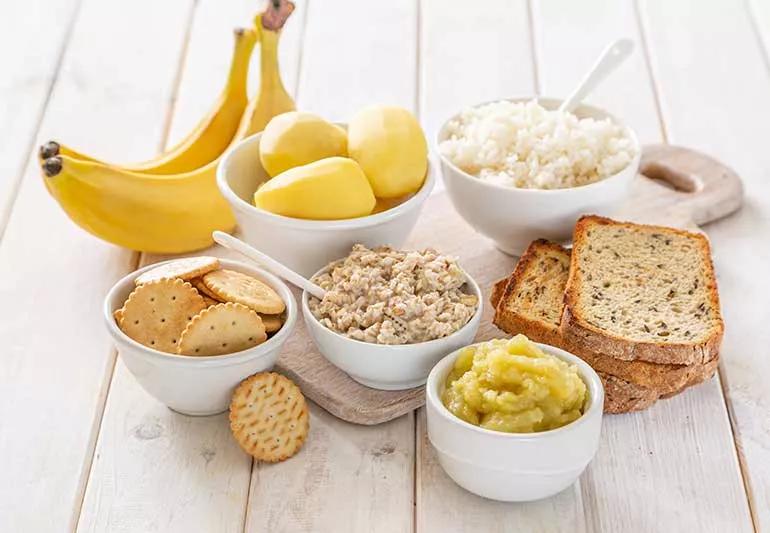Keep the menu plain and simple and make sure you stay hydrated

Image content: This image is available to view online.
View image online (https://assets.clevelandclinic.org/transform/c06bfc75-e7f8-41d7-82a0-8baa8fdf52b6/Foods-For-Diarrhea-1219151014-770x533-1_jpg)
Foods for diarrhea, commonly known as BRAT
Diarrhea. The word alone is enough to make you feel uncomfortable.
Advertisement
Cleveland Clinic is a non-profit academic medical center. Advertising on our site helps support our mission. We do not endorse non-Cleveland Clinic products or services. Policy
We’ve all experienced diarrhea. In fact, most people deal with it a few times a year after a disagreeable meal, bacterial infection or some other stomach-churning mechanism that turns your poop loose and watery.
The “runs” typically only last a day or so. (Let’s give some thanks for that, right?) But even if the very idea of hitting the kitchen during that time makes you queasy, you’ve got to eat and drink something.
Now the good news: Your food and drink choices can help ease diarrhea symptoms and get you back to feeling normal. Let’s set the menu with gastroenterologist and nutrition specialist Donald Kirby, MD.
The No. 1 rule for eating when you have diarrhea? Keep it simple. This isn’t the time to go on an exotic food and drink binge. “Plain and simple food is what people usually tolerate very well,” confirms Dr. Kirby.
So, here’s what to put on your plate and in your cups.
“BRAT” does not mean bratwurst in this instance. (Remember, we’re keeping foods plain, which definitely rules out this tailgating delicacy.)
The BRAT diet is an acronym that stands for:
Advertisement
Now, from a nutrition perspective, the BRAT diet isn’t the best. It’s lacking in protein, fiber and many vitamins. But the goal of the BRAT diet isn’t to check every nutritional box. Instead, it’s a quick and effective way to firm up your stool.
So, consider it a temporary solution to use for a day or two, says Dr. Kirby.
If you’re looking to add to the BRAT diet, the following foods can bring a little variety while also being gentle on your stomach:
Diarrhea often isn’t a one-and-done ordeal. Frequent trips to the bathroom for diarrhea can lead to a significant loss of fluid over the course of a day — and that can quickly leave you dehydrated.
Replenishing your body’s internal fluid and nutrient supply is essential to avoid dehydration and its complications. The solution? Try sipping on electrolyte-heavy drinks (such as Gatorade® or Pedialyte®).
Electrolyte drinks offer a bonus given the amount of sodium and sugar in the mixture. The sodium slows fluid loss and helps with fluid retention. The sugar, meanwhile, helps your body to absorb sodium. Win-win!
Salt has sodium, which — as we mentioned above — helps maintain fluid levels. Nibbling on saltine crackers or pretzels can give you a quick boost of sodium while also being gentle on your stomach.
And there’s always chicken noodle soup, the classic “sick food” menu item, which typically includes a decent amount of sodium. (Added bonus: The bouillon broth can help guard against dehydration.)
“We tend not to want people to have too much salt or sodium in general, but when you’re having significant diarrhea, you want to make sure you’re getting enough to stay out of the emergency room,” notes Dr. Kirby.
Eating food with probiotics can help your gut recover from a diarrheal infection. The live bacteria in probiotics help restore the beneficial intestinal bacteria needed to maintain a healthy gut microbiome.
Yogurt or kefir, a fermented milk drink, would be good choices despite being dairy products, which are typically a no-no with diarrhea, says Dr. Kirby. (Just make sure the yogurt or kefir are low in sugar.)
As important as it is to eat the right foods when you have diarrhea, it’s equally important to stay away from food that might trigger more gastric distress and worsen the situation.
Avoid these items to give your belly a break:
Advertisement
A bout of diarrhea should be short in duration. But if it continues for more than a few days despite diet modifications, increased fluid intake and anti-diarrheal medications … well, it’s time to check in with a healthcare provider.
See a doctor, too, if you experience severe pain or your stool contains blood or pus.
Advertisement

Sign up for our Health Essentials emails for expert guidance on nutrition, fitness, sleep, skin care and more.
Learn more about our editorial process.
Advertisement
Bananas, rice, applesauce and toast are easy on your stomach, but they don’t have enough vitamins and nutrients for more than a couple days
Stomach bugs, foods and excess bile or fats can cause yellow diarrhea
Yes, diarrhea is common after drinking too much alcohol — and the best treatment is to hydrate and wait it out
Pick bell peppers to help fight cancer, memory decline and joint pain
People with PKU need to avoid high-protein foods, like meat, dairy, legumes and whole grains
The caffeine and natural acids in coffee may trigger acid reflux, but there are ways to lessen the effects
Olive oil is high in heart-friendly unsaturated fats
The tropical fruit is a good source of antioxidants and vitamin C
Prioritize your health by managing stress, strengthening your social connections and getting quality sleep
Bolsters, blankets, pillows and blocks can offer extra support, stability and comfort
Allergies, postnasal drip, asthma or reflux could be to blame for a cough that won’t quit